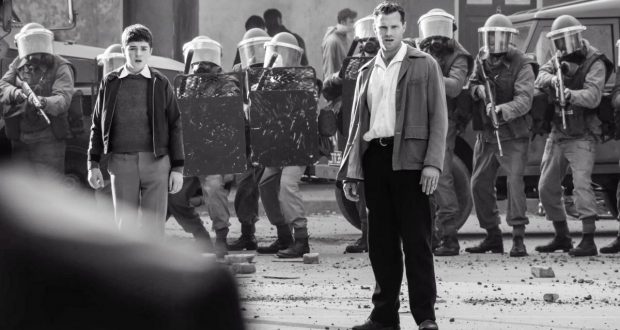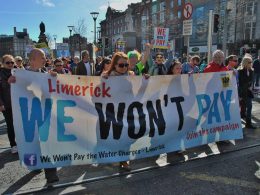Reviewed by Eoin Dawson
Kenneth Branagh’s biopic, Belfast, released in January 2022 to much applause. But for many Belfast natives, it fell flat. The film opens like an on-screen city break brochure, with all the modern visual icons, before fading to black and white and scenes of a typical Belfast street in 1969. Here we are introduced to a nine year-old Kenneth Branagh, “Buddy”, as he naively navigates Belfast at the outbreak of the 30-year conflict which became known as “the Troubles”.
For those familiar with the history of Belfast and the North more generally, “August 1969” splashed across the screen is foreboding. The idyllic opening is shattered by scenes of pogroms and shouts of “Catholics out”, as barricades are erected. While Buddy is largely shielded from the harsh realities by his parents and community, the audience catches glimpses throughout the film on background TV and radio broadcasts.
Branagh attempts to draw the stark contrast between the innocence of childhood and the violence of the Troubles. While his attempts are often banal, the on-screen performances go some way towards carrying the film. On-screen exchanges are scattered with “snappy Belfast banter” and light-hearted, tender and personal moments. Judi Dench, one of the few non-Irish/NI actors, does a very respectable accent as Buddy’s grandmother, a challenge which so many before her have failed abysmally. The lead, Jude Hill, gives an outstanding debut as Buddy, holding his own alongside seasoned veterans such as Dench and Ciarán Hinds.
Although nostalgic and very much a rose-tinted perspective, Belfast does depict a working-class Belfast community in the 60’s. While the overall atmosphere feels sanitized, the film records important, often forgotten aspects of the city’s working-class history. Working-class people on both sides fought hard against the slide towards civil strife. We see workers erecting barricades in defense of their entire community, not just “their own side”. The audience also learns that in those early years of the Troubles, paramilitary forces were resisted by many. Buddy’s father faces off against the local paramilitary leader, refusing “cash or commitment” and warns his eldest son against joining. The downward spiral into sectarian conflict was resisted and did not happen overnight.
The film also gives a glimpse of the hardships of working-class Belfast communities; tiny Victorian terraces, outdoor toilets and hiding from the “rent man”. Like many of their contemporaries, Buddy’s family struggles financially and his father is forced to leave for work in England, in a vain attempt to make ends meet. All this despite the danger of leaving his family behind as the city descends into violence. Meanwhile, an older family member slowly succumbs to the effects of their own time working across the water in the mines.
While Buddy’s father considers accepting a permanent post in England, his mother cannot bear leaving her beloved city. But as one character comments, “the Irish were born for leaving”. As anyone familiar with Branagh’s story will know, the family finally succumbs to the financial strain and threat of the Troubles, leaving their homes to travel to England. Like so many others, they do so not in hope, but in sadness and fear. Buddy’s mother gives voice to the pain at leaving their home and the anxiety of finding themselves as immigrants in a foreign land. Her feelings are sadly echoed by those fleeing conflict in other parts of the world today.
Belfast is in part an effort in addressing the issues faced by working-class communities in Northern Ireland at the outbreak of the Troubles. Sadly Branagh is so far removed from that reality that the end result feels forced. Nonetheless, Ciarán Hinds protests on his behalf; “you’re Buddy from Belfast 15, where everyone knows you… wherever you go and whatever you become that’ll always be the truth”. Few could be blamed for suggesting Branagh go outside and have a word with himself…
Belfast attempts to portray the outbreak of the Troubles from the naivety of a child’s perspective. While a nine-year-old boy can be forgiven for allowing the unfolding horrors to largely pass him by, the now 61-year-old Branagh cannot. Belfast glosses over the reality of both past and present. In doing so, Branagh does a disservice to the real trials and tribulations of the city’s people, but also their strength and resilience. The end result feels more like a ‘Tourism NI’ promotion than a love letter to Belfast, past, present or future.












